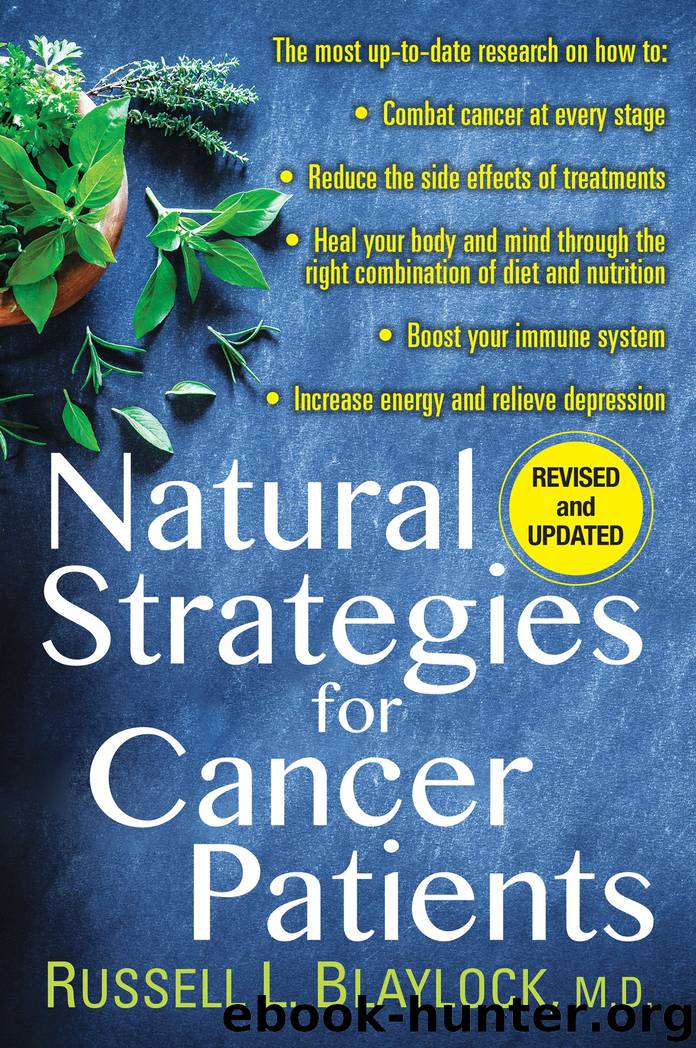Natural Strategies for Cancer Patients by Russell L. Blaylock

Author:Russell L. Blaylock [Blaylock, Russell L.]
Language: eng
Format: epub
Publisher: Kensington
Published: 2018-12-20T00:00:00+00:00
Methionine
The strongest evidence concerning the connection between tumor growth and the amino acids is found with L-methionine. Most of the evidence stems from the use of diets depleted of methionine. For example, giving patients with advanced gastric cancer intravenous nutritional supplementation using mixtures containing no methionine significantly slowed the growth of their tumors and made the tumors much more susceptible to chemotherapy. An analysis of the tumors showed that the methionine-deficient diet slowed cell division, freezing the cancer cells in the synthesis phase (S-phase) of reproduction, the phase in which the cell makes a copy of each of its chromosomes in preparation for cell division.65 This allowed the chemotherapy drug more time to kill more cancer cells.
Similar reductions in tumor growth have been seen in prostate cancer when methionine was restricted in the diet.66 It appears that at least one mechanism by which removing L-methionine accomplishes this is stimulation of the gene signal c-Jun N-terminal kinase-1 (JNK-1), a primary cell-signaling mechanism that triggers spontaneous cancer cell death.
While methionine can increase the growth of existing cancers, in the normal individual it appears to play a vital role in the prevention of cancer development.67 Methionine’s major role in preventing cancer development is based on the fact that it is the primary methyl donor in cells. Biochemically, L-methionine is converted to S-adenosylmethionine (SAMe), which then donates methyl groups for DNA regulation and repair. When there is a deficiency of methyl groups, cancer risk is greatly enhanced. In rare instances, overmethylation of the DNA can lead to cancer. This is why the supplement SAMe should not be taken by cancer patients or by people with a strong family history of cancer.
There is one instance in which too much L-methionine in the diet can increase the risk of cancer. Using a model of human familial polyposis, a disorder in which numerous precancerous polyps develop in the colon early in life, animals were fed a diet rich in L-methionine soon after birth.68 The researchers found that these animals did not develop more polyps, but that the polyps in the small bowel were larger and more likely to become malignant.
With the rather dramatic results being shown with methionine-deficient diets, we must ask: Will such a diet damage normal cells? As yet, we do not know the answer to this question. As I have mentioned, a low-methionine diet does increase cancer risk. However, one study in which both gastric cancer cells and normal stomach lining (gastric mucosa) cells were exposed to a methionine-deficient medium found that the cancer cells experienced significantly suppressed growth, but the normal cells of the stomach showed no effect.69
The major sources of methionine are meats (especially pork), beans, fish, nuts, and brewer’s yeast. The highest plant source is the Brazil nut, followed closely by the soybean. Ironically, these methionine sources are also major sources of glutamic acid and aspartate, which are suspected of promoting cancer invasion, especially with brain cancers, as well. Following is a list of foods that are high in methionine:
• Brazil
Download
This site does not store any files on its server. We only index and link to content provided by other sites. Please contact the content providers to delete copyright contents if any and email us, we'll remove relevant links or contents immediately.
| Bone Cancer | Brain Cancer |
| Breast Cancer | Colorectal |
| Leukemia | Lung Cancer |
| Lymphatic | Prostate Disease |
| Skin Cancer |
Men In Love by Nancy Friday(4327)
Everything Happens for a Reason by Kate Bowler(4067)
The Immortal Life of Henrietta Lacks by Rebecca Skloot(3826)
Why We Sleep by Matthew Walker(3773)
The Sports Rules Book by Human Kinetics(3588)
Not a Diet Book by James Smith(2726)
The Emperor of All Maladies: A Biography of Cancer by Siddhartha Mukherjee(2431)
Sapiens and Homo Deus by Yuval Noah Harari(2415)
Day by Elie Wiesel(2243)
Endless Forms Most Beautiful by Sean B. Carroll(2083)
Angels in America by Tony Kushner(2048)
A Burst of Light by Audre Lorde(1981)
Hashimoto's Protocol by Izabella Wentz PharmD(1898)
Dirty Genes by Ben Lynch(1856)
Reservoir 13 by Jon McGregor(1852)
Stretching to Stay Young by Jessica Matthews(1714)
Fat for Fuel by Joseph Mercola(1694)
The Immune System Recovery Plan by Susan Blum(1694)
Boost Your Brain Power in 60 Seconds by Michelle Schoffro Cook(1678)
